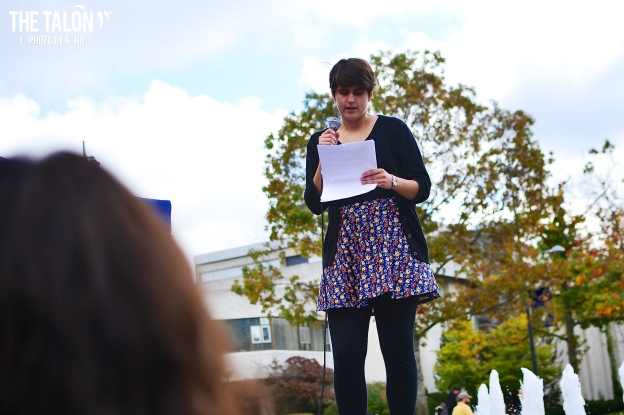Hello everyone. I want to start by echoing the sentiments of others who have spoken and thank you for taking the time to come out and learn and understand the complex dynamics behind everything that’s been happening these past few weeks.
My name is Kaitlyn Melton, and I am the president of the Residence Hall Association. Like May Anne, I represent many students and I have to acknowledge that they may have a wide variety of opinions that we haven’t had the time to hear yet. Instead, I am here to speak to you all a bit about housing, and provide some context to the changes that have been announced.
The first thing I want to talk about is the Residence Tenancy Act. The RTA is a roughly 50-page piece of legislation by the BC government that regulates the relationship between a landlord and a tenant. It sets standards for a myriad of things surrounding repairs, official agreements, and rent increases.
According to the RTA and BC law, the maximum increase in rent for 2015 is 2.5%. Comparatively, the increase that UBC is looking to push forward is approximately 20%.
The reason it’s possible for discrepancies like this to exist, is because approximately 12 years ago, a bill was passed that exempted UBC and other educational institutions from this act. On one level, its valid to recognize that institutions like UBC will operate and function fundamentally differently than those to which the RTA still applies. Logistically, the RTA might not be an ideal governing document for UBC Housing.
However, major concerns arise when this leaves the regulating body for University housing as the University itself. Acts like the RTA are created to keep both sides accountable for the relationship and to ensure fairness and responsibility. Without an external set of guidelines, this accountability can easily be lost.
Any actual policies set in place by the University regarding student housing are difficult to find, and from what we can tell, fairly limited. One that we were able to find is from UBC’s Housing Action Plan developed in 2012 and approved by the Board of Governors, and reads as follows:
Policy 11: To help address housing affordability concerns for students, the University will increase on-campus dedicated student housing supply, will continue to limit rental rates based on a self-supporting, fully cost-recovery basis, and will operate in a fiscally responsible fashion to ensure rates are maintained at or below market rental rates.
The content itself generates questions that others before me have raised about whether this should be a policy that drives UBC housing at all. However, this is an even greater question that I am not going to try and tackle today. Today I am simply going to question the extent to which UBC’s approach towards the current fee increases is even following their own policies, as so far it has only raised many concerns and some troubling questions.
The decisions about housing fee increases were brought to student leaders across campus framed as a decision they had already made, with little or no consultation up to that point. At this point in time, they are looking to consult with students and residents about exactly how this money should be directed.
Little to no information has been conveyed about exactly where this money is going, or how it’s going to be spent. How is it a fiscally responsible practice to demand 20% increase from your students without providing information of where this money is going to be going? Even looking at the most conservative estimates, these increases will bring another $4.5 million in revenue that is currently unaccounted for.
If such a large increase is indeed necessary and justified, how come it is being proposed on such a short timeline? What has rendered it necessary to propose such a drastic increase in a single year?
As students, we must continue asking these critical questions. I do not claim to be an expert on BC Law or the University’s policies, but I do understand the importance of accountability. As students, that accountability is now part of our responsibility, and I encourage you to ask the University these questions as well.
The concerns I’ve raised are just a few that tie into a much larger web of issues in a greater social and historical context. While I have spoken to a few things, I must acknowledge that there are many other sentiments and opinions to consider, and with that I must turn to my peers and fellow speakers today, as they have a wealth of information that I do not, as well as a greater ability to articulate those sentiments. With that, I ask you to listen and to pay them the same respect you have paid me and the other speakers.
Thank you!
Kaitlyn Melton is the President of the Residence Hall Association (RHA). The RHA is a student-run organization which represents students living in housing provided by UBC Student Housing and Hospitality Services.




